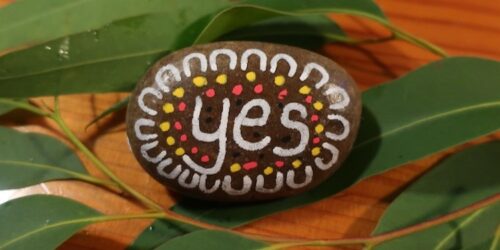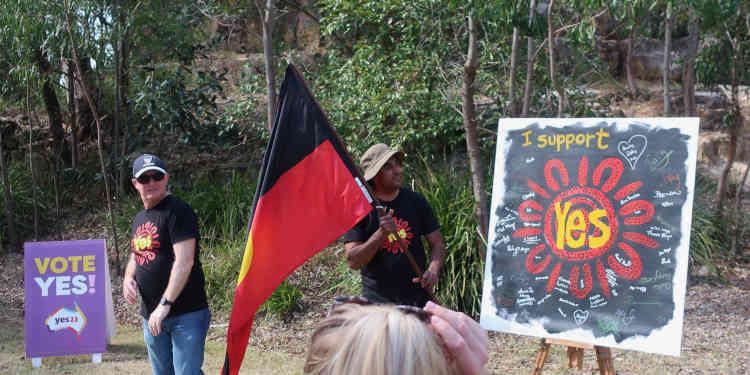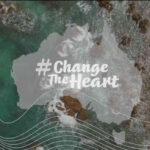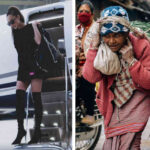My previous post (Is God woke?) led to me being asked some questions about First Nations people in Australia, and whether they deserve any special consideration by Government or white people generally.
I think we can only understand, and respond to, the present situation if we have considered the history of First Nations peoples and new settlers. So here is my understanding of how we got from there to here. (I have tried to be accurate here, but have had to simplify and in parts this is a personal perspective.)
All this is in the context of a referendum in about 2 months time which will ask the Australian people to agree to establishing a First Nations “Voice” to Parliament, an advisory body which will give First Nations people greater opportunity to seek justice and a better future through Government policy.
First Nations people before colonisation
The ancestors of the Aboriginal people arrived in Australia something like 60,000 years ago. By the time European settlers arrived in 1788, they were grouped into hundreds of nations, clans and languages. They lived a simple life governed by complex lore passed on by song, story and dance, and defining all aspects of life – behaviour, care of country, kinship and community. It was passed on and overseen by elders.
I would say their culture was built on respect – for country, for elders and for their lore or traditions. Unlike Europeans, they didn’t think the land belonged to them to use, or exploit, as they wished. Rather they were part of their country and stewards of it. So they moved around their country depending on the season and what food was available at the time. By carefully selecting what foods to eat and how much to take before moving on, their practices were sustainable.
The impact of European colonisation
The establishment of a penal colony in Sydney in 1788 had severely detrimental effects on the life of those clans in the vicinity, and eventually effected all Aboriginal and Torres Strait Islander people.
- They lost their country as European settlement expanded without respect for them, and saw their country destroyed as the colonists, cleared land, built towns and cities, and killed native animals. Many First Nations people were forced off their own country to live on another clans’ country.
- Many clans virtually wiped out by diseases like smallpox (to which they had no natural immunity).
- Many individuals and families were killed by settlers, either because the First Nations people resisted the invasion of their country, or simply to eliminate them. Hundreds of massacre sites have now been identified.
- Population numbers were drastically reduced. Those that remained lost their culture along with their land – traditional ceremonies, lifestyle and food sources were no longer possible – and in some cases they lost cultural memory because elders were unable to pass on lore.
- They experienced iscrimination, racism and treatment as “savages”, which tended to push them to the margins and sometimes led to them being effectively slaves.
- When Aboriginal people worked for Europeans, they were grossly underpaid, further worsening the gap between black and white.
- When clan family life disintegrated for many people, many children were removed from families, perhaps out of genuine concern for the child, but often with the aim of eliminating Aboriginal genetics and making the children effectively “white”.
Until the middle of the 20th century, white Australians treated First Nations people paternalistically and discriminately. They weren’t even counted in the Census until 1967.
First Nations people today
Several pathways were theoretically open to First nations people:
- They could try to retain as much of their traditional culture and life as possible. This might have been the default, but was more or less impossible due to the immense disruption to their land and culture. The result is that many remote Aboriginal communities have neither traditional sources of food, life and meaning nor white Australian property, income and respect.
- They could leave their culture behind and assimilate into white Australian life. Many do this, so that outsiders might not be aware of their heritage.
- Some First Nations people, perhaps more gifted or with more opportunity, have tried to retain identity while living within white society. However this was a difficult and slow journey – e.g. the first Aboriginal person to complete a University course graduated only in only 1959. Even today indigenous people are under-represented in Government, higher education, the media and senior management.
The outcomes for First Nations people have been poor (to say the least) in many areas: life expectancy, child mortality, early childhood education, progress in school, educational status, and employment. They are over-represented in substance abuse statistics, in the criminal justice system and in the number of children in out of home care. I believe these are all symptoms of cultural disfunction and loss of meaning and hope.
It is these latter statistics that form the basis of views that First Nations people shouldn’t receive special treatment and welfare, and need rather to “lift their game”.
Responses to Aboriginal disadvantage
A referendum in 1967 enabled First Nations people to be counted as part of Australia’s population and the Australian Government could make laws for them (previously it was all handled by the states, which led to inconsistency and discriminatory policies). Since then, the Australian Government has tried to address Aboriginal disadvantage. Since 2008 the Government has set specific “closing the gap” targets.
First Nations people receive higher per capita levels of Government support, though the exact amount has been argued over. It is clear that this support isn’t effectively closing the gap. Indigenous disadvantage remains, and in some cases is getting worse.There are two very different responses to this:
- First Nations people and advocates urge the government to consult more with indigenous people and spend more wisely. In the past white Australia has stolen their land, their wages, their children and their lives, it is argued, and we have a moral obligation to reverse the effects of this.
- Critics argue that too much has been wasted. Minority groups shouldn’t receive special treatment. Indigenous people have to simply work harder, sort out their substance and family abuse problems and get on with life like everyone else. Leave history behind.
The Voice to Parliament
In 2015, the Australian Government set up an extensive consultation process culminating in a First Nations National Constitutional Convention which produced a statement of how Aboriginal and Torres Strait Islands peoples wanted to be recognised in the Australian Constitution. This statement was called the Uluru Statement from the Heart, because it was, symbolically, the result of a meeting near Uluru in the centre of Australia.
The statement calls for structural reforms, recognising the continuing sovereignty of Indigenous peoples and to address structural “powerlessness” that has led to severe disparities between Indigenous and non-Indigenous Australians. It calls for Voice, Treaty and Truth.”
Later this year, Australians will be asked to vote in a referendum to support, or not support, the required changes in the Constitution.
My personal response
I have several indigenous friends and acquaintances and I know this is very important to them. My response flows from my friendship and awareness.
1. The suffering of indigenous people is undeniable
They weren’t treated humanely and they really did lose everything at the hands of European colonists. For many years they weren’t given a fair go. Their culture is much less individualistic than western culture, making it harder to fit in with white culture. They have evolved to thrive on a simpler diet and they are more prone to suffer from western diseases and conditions.
2. This mistreatment has had lingering effects
This past isn’t just history; it has lingering effects in the present. Stolen wages condemned so many Aboriginal people to a poverty-stricken life with limited opportunity. Poor education opportunities reduced employment opportunities. Intergenerational trauma affects mental health and wellbeing. Social inequality makes it more difficult to participate in society.
3. White Australia has never really addressed this issue
Throwing money at indigenous people doesn’t solve the problem and hasn’t helped all that much. Legally (apparently) there are three ways to address an invasion:
- The land was empty so you weren’t taking what belonged to someone else. But clearly the land wasn’t empty and the Mabo case demonstrated this legally.
- The conquered people surrender. This never happened. Activists say (correctly) that sovereignty was never ceded.
- The two sides can sign a treaty ending the fighting and outlining the terms of the peace. This happened in New Zealand, Canada and USA and elsewhere. Australia is one of the few colonised countries not to have a treaty with indigenous people.
I believe we need to make a treaty which addresses the current state of First Nations people, and get this process started in good faith by establishing the Voice to Parliament.
4. It’s the least we can do
Having taken away and destroyed so much, I believe white Austraolia has a moral obligation to give something back. And having paternalistically made decisions on behalf of First Nations peoples for more than two centuries, I believe we should give them the dignity of having a greater say in their future. Voice, Treaty, Truth is their request, made in humility and a spirit of reconciliation. Let’s give them that much at least!
5. What would Jesus do?
I think the Bible gives very clear principles that apply here:
- We are to have empathy with those who have suffered (Romans 12:15).
- We will be judged by how we treat those who are suffering (Matthew 25:31-46).
- We should bear each other’s burdens (Galatians 6:2).
- Good wishes must lead to helpful actions (James 2:16).
6. Response to the nay-sayers
Is this treating First Nations peoples differently to other groups?
Yes it is, and this is justified because we we have taken so much off them. All other Australian citizens (including me) are beneficiaries of their loss. They are in a unique position and deserve unique treatment.
Will this mean loss of land or other property or benefits for white people?
Even the Mabo decision, which was around land rights, hasn’t led to people losing land ownership – that is in fact specifically excluded. The Voice isn’t about land rights at all. This objection is designed to scare people but isn’t based on truth.
We have spent too much already.
The amount we have spent is a mere pittance compared to the value of the land we have stolen. But the Voice isn’t about more money, it is about recognising First Nations’ original sovereignty of the land, giving them a clear voice in laws that affect them and finally developing a treaty to tie everything together.
In summary
First Nations people are reaching out without anger, asking us to walk with them in undoing the sins of the past. I see no reason not to walk with them and love and justice demand that I do.
References
- Aboriginal and Torres Strait Islander Peoples. Australian Bureau of Statistics.
- A Brief Aboriginal History. Aboriginal Heritage Office (an initiative of 6 Local Government Councils in Sydney).
- Unsettled: Uncovering our nation’s hidden history. Australian Museum.
- Stolen Wages, Stolen Future. JB Solicitors.
- 1788 – Before European Settlement. Parliament of NSW.
- Aboriginal Life Pre Invasion. University of Tasmania.
- Working with Indigenous Australians. Muswellbrook Shire Council + Walking Together Reconciliation Committee.
- Only four of 19 Closing the Gap targets on track. Australian Financial Review, 2023.
- Uluru Statement from the Heart. Wikipedia.






A well presented case, however I contend that the Voice will make very little difference because Aboriginal people have already had the opportunity to present their case through representatives in Parliament (including Linda Burney in Cabinet) and nothing has changed, so either the demands have been unacceptable or they were rejected for other reason that were not released.
It all comes down to the detail of what indigenous people actually want (ie what recommendations the Voice will make). Will we ever know this ? If advice is given to Cabinet this is likely to be confidential.
I suggest that they can tell us now through the media but they appear to choose not to. Maybe they want to be exempt from the justice system that the rest of us have to adhere to. Maybe they want final say in all planning decisions or land use changes. In any case a permanent taxpayer funded body like what is proposed is no more capable of expressing their views (publicly) than other forms of communication available to them.
“As of 2020, Aboriginal and Torres Strait Islander peoples’ rights and interests in land are formally recognised over around 40 per cent of Australia’s land mass, and sea rights have also been asserted in various native title cases.”
https://en.wikipedia.org/wiki/Indigenous_land_rights_in_Australia
Obviously problems are going to occur when cultures collide. The rates of domestic violence in indigenous settlements is far higher than in the general community. Do we give autonomy to the elders of those communities to control the problem or intervene in some way ? Either way the government will probably be blamed.
I contend that your reference to the University of Tasmania’s “Aboriginal Life Pre Invasion” sounds like a sugar coated piece of propaganda. According to other historians, aboriginal life pre settlement was brutal and competitive and resulted in internal infanticide and family violence.
https://quadrant.org.au/magazine/2020/10/life-and-death-in-pre-contact-aboriginal-australia/
I would also say that had not the British colonised Australia, others would have which could have been more disastrous to the aboriginal population (Japan perhaps). So although the aboriginals couldn’t be considered “lucky” it could have been worse in my opinion.
What is the answer ? By all means the indigenous people should have their say, maybe through a legislated body, but it should be done publicly so we all get a chance to express our views instead of being given under cover as it will most likely be with a Constitutional body.
Hi, thanks for your thoughts. Obviously I disagree about some matters, but I won’t go over what I have said again. But a few extra points….
But they are there to represent all those in their electorate or state, so they can’t really represent speciific Aboriginal interests.
This isn’t part of the referendum, which is only giving the government the constitutional power to set up the Voice. The details will be worked out in the cut and thrust of parliament, and can be changed in the sdame way. The wording says it will be a voice to “Parliament and the Executive Government”, so I doubt it will be secret, but that depends on what actually passes through parliament.
I’m not at all sure that a “Voice” is the best way forward but I feel it is time to give them what they have overwhelmingly asked for and see if it works. I certainly believe more is required, but I’d like to do that they way they ask. The Aboriginal people I know seem to most want to be respected and listened to, and to have their past bad treatment recognised, sort of like Nelson Mandela’s Truth and Reconciliation Commission.
The Aboriginal people I know seem to most want to be respected and listened to, and to have their past bad treatment recognised, sort of like Nelson Mandela’s Truth and Reconciliation Commission.
I would be very interested if your Aboriginal friends would answer the question “If you were a Voice representative what recommendations would you make to close the gap ?”
Because that is the essential issue, asking people on the ground not some committee.
I really do wish them well and hope some positive change can be made.
Incidentally, Linda Burney is the Minister, so she doesn’t just represent her electorate, but the whole Aboriginal population. She should be getting the feedback and putting it to Cabinet. The Uluru statement seems to be a vote of no confidence in her if they feel not enough is being done.
Anyway, the vote will be held and we will see what happens.
I have two thoughts on what you say here.
1. I think it is a mistake to ask for recommendations on closing the gap. I’m sure there would be so many different situations and so many different responses, there wouldn’t be one formula. The Voice would consult widely (something Linda Burney wouldn’t be able to do adequately) but also able to make recommendations appropriate for each place. If they can’t come up with any thing then we’re no worse off because it isn’t working now.
2. If a lot of the problems are caused by loss of meaning, purpose and identity, and intergenerational trauma, then just having a Voice and some recognition that First Nations people need a different way to be represented might be very helpful
As you say, we’ll wait and see. It looks close to 50/50 at present.